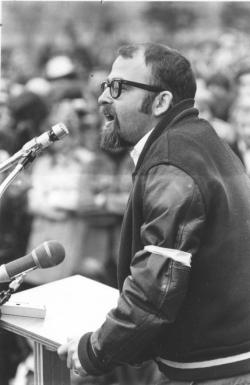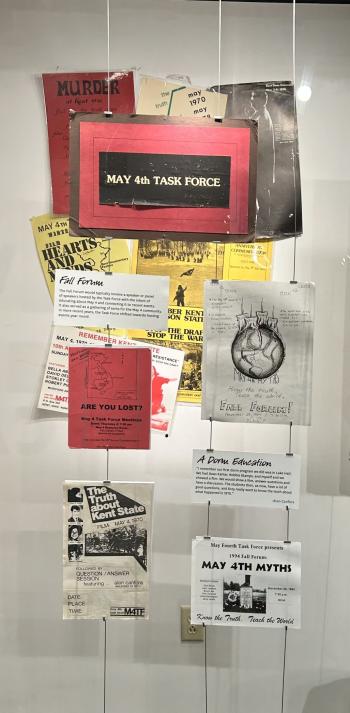Past Exhibits
Teach Peace: The Life and Legacy of Jerry Lewis

March - October 2025
Jerry Lewis was professor of sociology at ĚěĚěłÔąĎ from 1966 to 1996. He witnessed the May 4 shootings as a faculty marshal and dedicated much of his career to researching, memorializing, and lecturing about the events of May 4, 1970. This exhibit explores Lewis’ career as a teacher, academic, faculty marshal, collector and chronicler who was driven by his dedication to May 4 and passion for its preservation.
The Truth Demands Justice: 50 Years of the May 4 Task Force
March - October 2025

From penning letters to presidents and famous activists to setting up pallet stages and drafting press releases and op-ed pieces, the power and potential of ĚěĚěłÔąĎ State students is no more evident than in the work of the May 4 Task Force.
Upon forming in 1975, the initial goals of the May 4 Task Force were educating students about the events of May 4, 1970, and acting as a liaison between the student body and the families of the victims., Organizing educational events, designing swag, advocating for memorials and class cancellations, and engaging in the occasional political protest have been among the Task Force accomplishments over the past 50 years.
This exhibition highlights the history of the May 4 Task Force through posters, artifacts, ephemera, and the words of Task Force members themselves as they kept the spirit of May 4 alive.
Then and Now
Fall/Winter 2024
Exhibit by Jeremy Ritch and Alison Caplan

The tragedies of May 4, 1970, when four students lost their lives during a protest against the Vietnam War, serve as a poignant reminder of the consequences of civic engagement and the importance of vehemently advocating for one's beliefs.
Today’s students carry the torch of activism, drawing inspiration from those who fought before them. Current movements on campus reflect a mosaic of issues, from racial equality to divestment campaigns, echoing the past struggles against injustice. There is a palpable energy as students rally together, employing social media platforms to organize and amplify their voices.
The cycle of protest at ĚěĚěłÔąĎ State is not just a footnote in history; it is an ongoing narrative that challenges students to confront injustice boldly and creatively. ĚěĚěłÔąĎ continues to be a pivotal site for student activism, underscoring the importance of standing up for one’s beliefs in the pursuit of social change.
Exhibitions like this one serve a crucial purpose—they act as a bridge between past and present, reminding students that their voices still matter.
Vote 18
“Old Enough to Fight, Old Enough to Vote:” Student Activism and Presidential Politics
Fall 2024

The events of May 4, 1970 at ĚěĚěłÔąĎ State became the cornerstone for the ratification of the 26th Amendment, expanding voting rights to 18-20 year olds. In response to the Vietnam war draft, young Americans organized to lower the voting age from 21 to 18; working toward a constitutional amendment.
In 1969, Ohio voters were faced with a state amendment to lower the voting age from 21 to 19, the issue failed by 1.9%. Protesting remained the most effective way for young voices to be heard, four of which were killed on the ĚěĚěłÔąĎ State campus by the Ohio National Guard, bringing the Vietnam War home on American soil. In response, the proposed 26th Amendment saw rapidly increased support and was ratified on July 1, 1971. Newly enfranchised citizens cast their first votes in the 1972 presidential election between incumbent President Richard Nixon, and George McGovern, the anti-war senator from South Dakota.
This exhibit explored the material culture of the youth fight for suffrage and the 1972 campaign.




